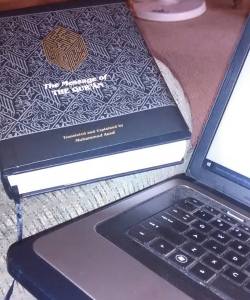In the wake of the terrorist attacks in Paris understandably there was and still is tremendous alarm, fear, and anger. The threat of ongoing attacks have left the world waiting for the other shoe to drop. In the United States this weekend, especially in major cities, many will shop with trepidation in their hearts over more than just spending too much. Tensions are running high, and the potential for overreaction is high as well.
After the 9/11 attacks here in America hostility toward Muslim Americans in general boiled. In one case as an apparent act of retaliation someone shot a man wearing a turban. Lost on the perpetrator was the fact that the man wearing a turban wasn’t Muslim; he was a Sikh, of a different religion altogether. Even if he was a Muslim it would still just be murder, plain and simple, a deplorable act of seeking revenge against an innocent victim.
Whether the perpetrator claimed to be Christian, I don’t know. But Christians should never seek vengeance at all, much less commit cold blooded murder against a random person who looks like they might be Muslim. Christians should leave room for justice to be carried out through the God ordained governing authorities, not take matters into their own hands (Romans 12:9-13:7).
Neither should we stir up any generalized hatred for Muslims. It should go without saying that not all Muslims are terrorists; Muslims that groups like Isis consider to be compromised, hypocritical, or apostate are targeted along with Christians, Jews, and other non-Muslims. They need our prayers and support too, including the refugees, which I believe our churches, Christian ministries, and government can help compassionately and cautiously.
Although there are millions of Muslims who are radical or very sympathetic toward the cause of Isis, most are people who just want to live their lives and make a better life for their families while they follow a religious tradition that they hold dear. There are Muslims such as Dr. Zuhdi Jasser and Egyptian President Abdel Fattah al-Sisi who are calling for reform within Islam. Many more need to stand with people like them to thwart the radical vision of militant jihadists.
Overreaction, however, can work in more than one way. Christians should absolutely discourage and denounce hatred and bigotry against Muslims simply because they are Muslims, and, instead, encourage and promote compassion toward them. We shouldn’t, however, go overboard by understating the very stark differences between Islam and Christianity. We can be pro Muslim without being pro Islam; by which I mean we can have respect and compassion for Muslim people without giving credence to Islam.
In the wake of the Paris attacks some Muslim apologists were quick to denounce the terrorists. Some quoted a verse from the Quran in their denunciation, Surah 5:32. Really they only quoted a small portion of the verse. I saw a meme being shared on Facebook in defense of Islam, which contained this partial verse a couple of times at least. It read, “…Whosoever kills one innocent human being, it shall be as if he killed all mankind, and whosoever saves the life of one, it shall be as if he saved all of mankind...”
I have been reading a translation of the Quran by Muhammad Asad, formerly Leopold  Weiss, a Austrian-Polish Jew who converted to Islam, over the past few months. It was sent to my church to my attention earlier this year by CAIR (the Council on American Islamic Relations). A couple of days before the attacks in Paris, I had read through Surah 5. When I saw the postings of that verse I immediately recognized that something was missing. A couple of days later a fellow Methodist minister also posted a similar meme with the same partial verse in defense of the majority of peaceful Muslims. But to only quote that small part of the verse is misleading and really doesn’t help to allay the fears and suspicions those doing the quoting hope to allay when people find out that verse also contains a major exception clause to that statement. Here’s Surah 5:32 in its entirety with my explanatory comments in parentheses:
Weiss, a Austrian-Polish Jew who converted to Islam, over the past few months. It was sent to my church to my attention earlier this year by CAIR (the Council on American Islamic Relations). A couple of days before the attacks in Paris, I had read through Surah 5. When I saw the postings of that verse I immediately recognized that something was missing. A couple of days later a fellow Methodist minister also posted a similar meme with the same partial verse in defense of the majority of peaceful Muslims. But to only quote that small part of the verse is misleading and really doesn’t help to allay the fears and suspicions those doing the quoting hope to allay when people find out that verse also contains a major exception clause to that statement. Here’s Surah 5:32 in its entirety with my explanatory comments in parentheses:
“Because of this (the context is a telling of the story of Cain killing Abel) did We (Allah – plural of majesty) ordain unto the children of Israel that if anyone slays a human being – unless it be [in punishment] for murder or for spreading corruption on earth – it shall be as though he had slain all mankind; whereas if anyone saves a life, it shall be as though he had saved the lives of all mankind
And, indeed, there came unto them Our (Allah’s) apostles with all evidence of the truth: yet, behold, notwithstanding all this, many of them go on committing all manner of excesses on earth.” (Muhammad Asad’s translation)
Some point out that this verse is talking about a command that Allah gave to the Jews and suggest that it doesn’t apply to Muslims. I don’t think that is really the case here. My reading of the Quran suggests to me that this would be considered a universal principle revealed by Allah to the Jews but is applicable to all people. Nevertheless, did you notice the exception clause, which I put in bold?! Those who object to capital punishment altogether notwithstanding, the exception for punishment in cases of murder is understandable, but what about “spreading corruption on earth”? (some translations say “mischief”) What exactly does that mean?
The last part of verse 32 indicates an indictment against those Jews who rejected the truth purportedly revealed by Allah who continued to commit all manner of excesses (Asad’s commentary says i.e. “crimes”) on earth. The following verse, 33, is very telling with regards to what the details of the punishment clause might entail.
“It is but a just recompense for those who make war on God and His apostle, and endeavor to spread corruption on earth that they are being slain in great numbers or crucified in great numbers, or have, in result of their perverseness, their hands and feet cut off in great numbers, or are being [entirely] banished from the face of the earth; such is their ignominy in this world. But in the life to come [yet more] awesome suffering awaits them (Surah 5:33) (verse 34 does offer reprieve to those who repent though)
Asad, who in other places argues that Islamic warfare is only acceptable in cases of defense against aggression, here notes that “to make war on God and His apostle” means “a hostile opposition to, and willful disregard of, the ethical precepts ordained by God and explained by all His apostles combined with the conscious endeavor to destroy or undermine other people’s belief in God as well.” Moreover, the phrase “spreading corruption on earth” does come up enough in the Quran to give much more insight into just how broadly it can be interpreted.
Surah 5:64 specifically identifies Jews and Christians, who have rejected the claims of the prophet Muhammad, and who, throughout the Quran, are accused of proclaiming a corrupted version of the original revelation given by other prophets of Islam, which includes Moses and Jesus, as those who “spread corruption on earth.” The Quran teaches that it is the Quran that preserves the purity of what remains of the original revelation given to Moses and Jesus, among others, before their later followers corrupted it (i.e. Surah 2:97; 12:111) The phrase “spreading corruption on earth” comes up enough to see that at its heart is a denial of what the Quran teaches is true and promoting teaching which is contrary thereto, especially ascribing divinity to things or beings other than Allah (See Surah 2:7-12; 2:25-27; 2:60-61). The end of Surah 18:15 asks, “who could be more wicked than he who invents a lie about God?” So the terms of the exception clause are very broad and can easily be interpreted to include speech or writing which is critical of Islam, the teachings of the Quran, and the prophet Muhammad. Many millions of Muslims do interpret it this way.
In an effort to discourage others from categorizing all Muslims as terrorists or even terrorist sympathizers we shouldn’t overreact and intentionally or unintentionally bear false witness about what the Quran actually teaches. Neither should we overreact and promote the idea that there are not serious and very fundamental differences between Christianity and Islam – or the idea that all religions are really the same and have the same ultimate goals. Muslim and Christian dialogue is very important and I would like to see much more of it, but not at the expense of downplaying the differences, which come down to some very central and crucial issues.
The differences between Islam and Christianity go to the heart of both worldviews, striking at the core of identity for both faiths. Take John 3:16 as a very poignant case in point.
“For God so loved the world, that He gave His only begotten Son, that whosoever believeth in him should not perish, but have everlasting life.” (KJV)
According to Christianity, this is the gospel, the good news; according to Islam it is blasphemy.
“O followers of the Gospel! Do not overstep the bounds [of truth] in your religious beliefs, and do not say of God anything but the truth. The Christ Jesus, son of Mary, was but God’s Apostle – [the fulfillment of] His promise which he had conveyed unto Mary – and a soul created by Him. Believe, then in God and His apostles, and do not say, ‘[God is] a trinity. Desist [from this assertion] for your own good. God is but One God; utterly remote is He, in His glory, from having a son: unto Him belongs all that is in the heavens and all that is on earth; and none is as worthy of trust as God” (Surah 4:171)
Countless are the times the Quran condemns the sin of shirk, the attributing of divinity to anything or anyone, especially including Jesus, other than Allah. According to Islam John 3:16, as well as most of the rest of the the Gospel of John must be a corruption of the original Gospel that was given to Jesus himself. The difference here could not be any starker. There are competing claims that are diametrically opposed to each other. Both could be false, but only one can be true. Is John 3:16 a beautiful summary of the Gospel or is it a blasphemous corruption? Obviously I believe the former; it is the good news of God’s love revealed in His Son, Jesus Christ, who was the Divine Word, who was God, who became a human being who gave His life as an atoning sacrifice for the sin of the world on the cross (John 1:1 …) (By the way, the Quran also denies the crucifixion of Jesus and Muslim theologians dismiss any kind of substitutionary atonement as it teaches repeatedly and frequently salvation and forgiveness by faith in the absolute oneness of Allah and righteous deeds).
I was once also a denier of the Trinity and the Divinity of Christ (read about my testimony at Wall to Wall Faith, Hope, and Love – scroll down to the first post to begin reading my story or find summary short summary here). I remember reading about the teachings of Islam regarding Jesus when I believed that Jesus was merely a man, a perfect man conceived of a virgin, but still just a man. I remember thinking that if Muslims only knew that the Bible really didn’t teach the Trinity or that Jesus was God in the flesh, maybe they would become Christian, as I then understood the term. It was also interesting to read the autobiography of Malcom X and see the similarities between his own arguments against the Trinity and the Deity of Jesus and mine – not to mention his journey from a quirky sect of Islam, the Nation of Islam, to mainstream Islam. The other day I also watched a video of Muhammad Asad explaining why he became a Muslim and why he rejected Christianity. His basic argument was once mine as well. Malcom X, Muhammad Asad, I, and countless others have rejected the Trinity because it seemed to go against reason.
The word Islam could be defined as peace through submission to the revelation of God. In my case I realized that I really didn’t have peace with God because I refused to submit to the revelation of God found in the Bible, especially the New Testament. The truth is the New Testament hasn’t been misinterpreted to teach the concept that came to be called the Trinity, as I once believed, nor has its contents been so badly corrupted as to obscure the original teachings of Jesus or his earliest followers beyond recognition. To finally be at peace with God I had to surrender to the revelation of the New Testament that testifies that God gave His Divine Son to save me from my sins. I had to confess Jesus as my Lord and my God (John 20:28) and surrender my life to Him through faith to be forgiven and filled with His Spirit. I had to cast down the arguments that I had exalted above the revelation of God’s word. I had to believe even though I could not see, fully comprehend, how it all could be. I believe Muslims must do the same.
Yes we must be careful not to overreact when radical Islamists commit terrorist attacks. That also includes not downplaying the stark differences between Islam and Christianity. We Christians must be willing to stick our necks out to proclaim the Good News of the love of God revealed in and through His Son, Jesus the Messiah and our Lord and to talk about these differences with our Muslim neighbors and friends, even at the risk of being condemned for being politically incorrect or for “spreading corruption on earth.” Bullets and bombs won’t ultimately defeat terrorism, but I believe the love of God revealed in His Son Jesus Christ will.



